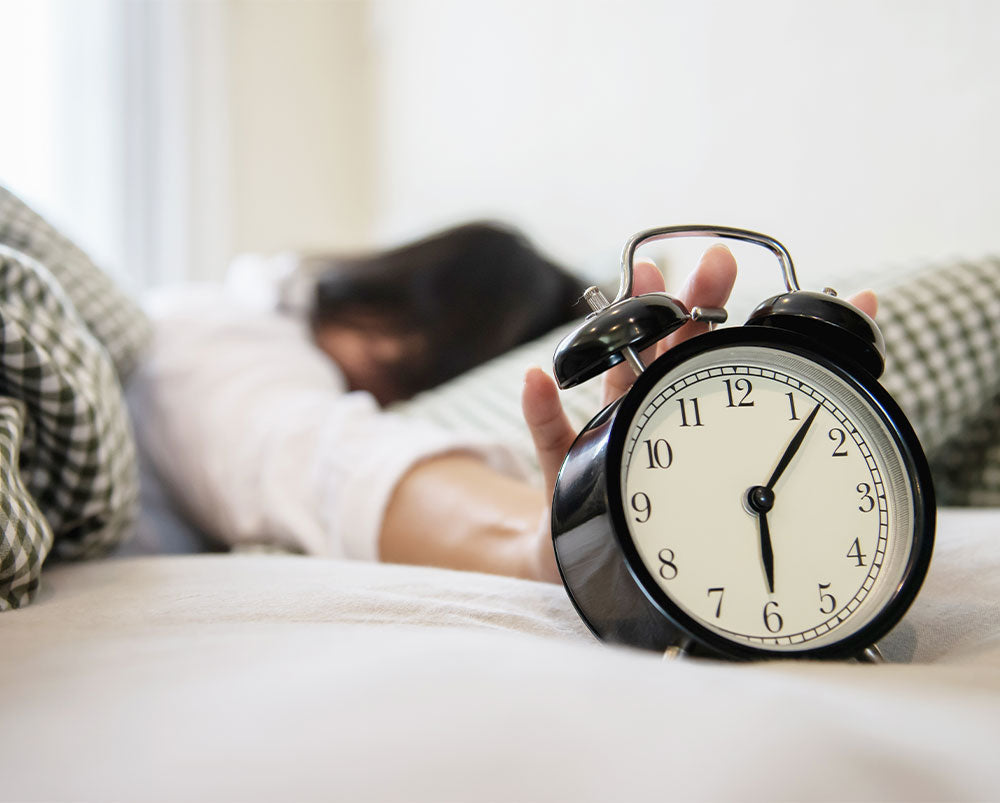Do you toss and turn every night, unable to get a good night's rest? You're not alone. Insomnia affects millions of people worldwide and can have a significant negative impact on your physical and mental health. But what is insomnia? In this blog, we will break down the different types of insomnia, its causes, symptoms, and treatment options available to you. We'll also explore the role of anxiety and stress in this sleep disorder and answer the question on everyone's mind: Is there a cure for insomnia? With our energetic and confident tone, we're here to help you finally get the restful sleep you deserve. So sit back, relax, and let's dive into everything you need to know about insomnia!
Understanding Insomnia and sleepless disorder
Mastering the art of quality sleep and its impact on daily life is paramount. The significance of sleep hygiene cannot be overstated, as it directly influences insomnia symptoms. Chronic insomnia is closely intertwined with mental health conditions and can't be overlooked. A revolutionary method like cognitive behavioural therapy holds promise for relieving insomnia symptoms, emphasizing the indispensable role of health information in addressing the detrimental effects of insomnia.
When addressing a sleep disorder like insomnia, it's important to consider the underlying causes for effective treatment. Symptoms can vary due to hormonal changes, making it essential to promote good sleep habits with a comfortable temperature and relaxation techniques. Understanding the sleep cycle is crucial in addressing insomnia and achieving relief. Incorporating techniques such as a sleep diary, soft music, and practising good sleep hygiene can help counter symptoms and improve sleep quality.

Different Types of Insomnia and Misconceptions
Insomnia during pregnancy can significantly impact the quality of sleep, often due to hormonal changes and mental health issues. Understanding the average cycle becomes crucial in addressing period insomnia while monitoring hormone levels is essential for identifying and managing sleep problems during pregnancy. The correlation between hormonal changes and sleep disturbances underscores the significance of considering the medical history and potential side effects of countermedications. Moreover, recognizing the link between hormone levels and mental health issues during pregnancy is imperative for effectively addressing sleepless disorder in expecting mothers.
Despite common belief, insomnia symptoms are not always indicative of depression. Chronic pain can significantly contribute to primary insomnia, and the fluctuation of hormone levels during perimenopause is closely linked to sleepless disorder. Furthermore, various health conditions can disrupt sleep patterns and habits, leading to the misconception that sleepless disorder solely results from mental health issues. Additionally, medical conditions can also cause secondary insomnia symptoms, posing a challenge for accurate diagnosis and treatment. It's essential to address these misconceptions to ensure effective management of insomnia and related sleep disorders.
Period insomnia
Interconnected with menstrual cycle changes, period insomnia can be attributed to the rise in progesterone during premenstrual syndrome, impacting sleep quality. The variations in the average cycle can trigger symptoms of period insomnia, often linked to PMS. Moreover, the sleep patterns are affected by hormone imbalance during premenstrual dysphoric disorder. Understanding these connections is crucial in addressing period insomnia and its impact on overall well-being. By recognizing the influence of hormonal fluctuations, individuals experiencing period insomnia can take proactive steps to improve sleep quality and mitigate its effects on daily life.
insomnia and period relief
To manage insomnia, track your menstrual cycle for sleep patterns. This helps you anticipate and address sleep disturbances. Adjust your bedtime routine, try relaxation techniques, or use natural remedies like herbal teas or essential oils. Consistency in your sleep schedule is also important. Go to bed and wake up at the same time every day, including weekends, to regulate your body's sleep-wake cycle.
Regular exercise, mindfulness, and emotional support can reduce anxiety and promote relaxation. Taking care of your mind and body may decrease insomnia during your menstrual cycle. It's important to address hormonal imbalances that contribute to sleep disturbances. Consulting with a healthcare professional can help manage hormonal fluctuations affecting your sleep.

Insomnia during pregnancy
Quality sleep during pregnancy is crucial for both physical and mental well-being. Hormonal changes, particularly the rise in progesterone levels, can significantly impact sleep patterns. Addressing insomnia symptoms during pregnancy is essential to mitigate the effects on overall health. Effective treatment options and understanding the impact of hormonal changes are vital. Sleeplessness during pregnancy can have long-term implications, making it important to prioritize healthy sleep habits and seek appropriate care.
Insomnia While Pregnant Relief
Establishing a consistent bedtime routine is crucial for better sleep during pregnancy. This includes going to bed and waking up at the same time each day. Creating a calm and relaxing bedroom environment with dim lighting and comfortable bedding is also important. Relaxation techniques like deep breathing exercises or meditation can help prepare the mind for sleep. Avoiding stimulating activities and electronics before bedtime is advised as well. Regular physical activity during the day can promote better sleep at night, but consult a healthcare professional before starting any exercise routine. Some natural remedies like herbal teas or prenatal massage may provide relief from insomnia but consult with a healthcare provider first.
Insomnia and perimenopause
Hormonal fluctuations during perimenopause can lead to sleep disturbances, impacting overall well-being. Addressing these changes is key to alleviating insomnia symptoms, underscoring the close link between hormonal shifts and sleep quality. Additionally, recognizing and addressing mental health issues during perimenopause is crucial for managing insomnia effectively. Furthermore, identifying and treating underlying medical conditions can significantly improve sleep patterns during this transitional phase, promoting better physical and mental health. Understanding the interconnectedness of hormonal, physical, and mental factors is essential in addressing perimenopausal insomnia.

Unpacking the Causes of Insomnia
Identifying the root cause of poor sleep is vital for effective treatment. Mental health factors, like stress and anxiety, can significantly impact sleep patterns and lead to insomnia symptoms. Additionally, long-term health conditions and chronic pain can also disrupt the quality of sleep. It's crucial to recognize how significant life events can affect sleep, leading to insomnia. Understanding these underlying causes, including mental health, physical health, and significant life events, is essential for developing tailored treatment plans and improving sleep quality.
Physical and mental health factors
Underlying medical conditions significantly influence the manifestation of insomnia symptoms. The presence of chronic pain and physical health issues can exacerbate the onset and severity of sleepless disorder. A comprehensive physical exam plays a crucial role in identifying and addressing the root causes of insomnia. Long-term health conditions have the potential to disrupt regular sleep patterns and compromise the overall quality of sleep. The debilitating impact of sleepless disorder and chronic pain on daily life cannot be underestimated, emphasizing the imperative need to address physical health factors in the management of insomnia.
When it comes to understanding insomnia, it's essential to recognize the strong link between this sleep disorder and mental health conditions. Stress and various mental health issues like anxiety and depression can significantly contribute to the symptoms of insomnia, affecting both the onset and quality of sleep. Identifying these mental health issues is crucial in effectively addressing and treating sleepless disorder. Fortunately, there are various treatment options available that specifically target mental health-related sleepless disorder, ultimately aiming to improve the overall quality of life for individuals experiencing severe symptoms.
Lifestyle and environmental influences
Environmental elements, such as excessive noise and light, have the potential to disrupt natural sleep patterns, leading to difficulties in falling asleep or staying asleep. Unhealthy sleep habits and irregular sleep schedules can significantly impact the overall quality of sleep, potentially contributing to the development of insomnia symptoms. Additionally, the use of electronic devices before bedtime can interfere with the body's natural circadian rhythms, making it more challenging to achieve restful and restorative sleep.

Recognizing Symptoms of Insomnia and early signs
Recognizing the signs of insomnia involves identifying common symptoms like difficulty falling asleep, staying asleep, or waking up too early. Additionally, indicators such as fatigue, irritability, and struggles with concentration can suggest underlying sleep issues. Moreover, persistent fixation on sleep and experiencing daytime sleepiness are vital symptoms to recognize. Understanding these signs can help in early intervention and seeking appropriate treatment for sleep disorders. Recognizing these symptoms early can lead to effective management strategies, promoting better sleep quality and overall well-being.
Frequent trouble sleeping and feeling unrested are initial indicators of potential sleepless disorder. Experiencing sleep disturbances and difficulty falling asleep on a regular basis can signal the onset of this sleep disorder. Additionally, waking up frequently during the night and struggling to fall back asleep are crucial early red flags for insomnia. It's important to recognize these signs promptly to seek appropriate guidance and prevent the exacerbation of the condition.
When to seek professional help
If insomnia significantly disrupts daily life or functioning, it's imperative to seek professional help. Consulting a healthcare professional is advisable if the sleepless disorder persists for over a month. Sudden severe insomnia or worsening symptoms should also prompt seeking help. These indicators signal the need for expert intervention to address the underlying causes and develop an effective treatment plan. It's important to recognize the severity of the condition and take proactive steps to improve sleep quality and overall well-being.
Insomnia Relief Treatment Options
Maintaining optimal sleep hygiene and embracing self-help strategies can greatly contribute to effectively addressing insomnia. Implementing cognitive and behavioural therapies, including relaxation techniques and stress-reduction methods, has shown promising results in enhancing sleep quality and duration. Additionally, for individuals battling severe cases of insomnia, considering the option of medications and over-the-counter sleep aids may offer viable solutions to alleviate symptoms and improve sleep patterns.

Self-help strategies and good sleeping habits
Maintaining a consistent sleep schedule and creating a relaxing bedtime routine can aid treatment. Improving sleep quality involves avoiding caffeine, nicotine, and heavy meals close to bedtime. Engaging in physical activity during the day and managing stress levels is also beneficial. Incorporating these strategies can help regulate body temperature and contribute to healthy sleep patterns. Additionally, establishing a sleep diary and incorporating soothing elements like soft music or a comfortable sleep environment can aid in addressing restless legs syndrome and night terrors. Adhering to good sleeping habits is essential for managing various sleep changes and disorders.
Cognitive and behavioural treatments
Addressing negative thoughts and behaviours impacting sleep, cognitive behavioural therapy (CBT) offers tailored solutions. Incorporating relaxation techniques like deep breathing and meditation, CBT aims to reshape sleep patterns for enhanced quality. By focusing on altering detrimental sleep habits, CBT promotes healthy and restorative sleep. Restless legs syndrome, shift work, and medical history are crucial considerations in CBT. Recognizing the impact of lifestyle and environmental influences, CBT advocates a holistic approach to- sustainable improvement. Embracing a healthy diet, managing body temperature, and maintaining a sleep diary complement the efficacy of cognitive and behavioural treatments.
Most effective over the counter sleep aid
While addressing short-term insomnia, prescribed sleep medications and over-the-counter sleep aids play an essential role. For severe insomnia, medications such as benzodiazepines and non-benzodiazepine hypnotics are commonly prescribed. On the other hand, the occasional sleepless disorder can be managed using over-the-counter sleep aids like melatonin and antihistamines. These options provide effective assistance in managing sleep difficulties, contributing to improved overall well-being and quality of life.

The Role of Anxiety and Stress in Insomnia
Understanding the impact of stress and anxiety on sleep is crucial for managing poor sleep. Chronic stress and anxiety can lead to prolonged sleeplessness and sleep changes. Managing stress and anxiety levels is essential for improving sleep quality and addressing insomnia. Restless legs syndrome, jet lag, and sleep changes also play a role in sleep disorders. It's important to address these issues to achieve a healthy sleep pattern and counter medical history. Recognizing the influence of anxiety and stress on sleep can lead to effective treatment and long-term solutions.
Understanding the connection between stress, anxiety, and sleep
Chronic stress and anxiety can lead to prolonged sleeplessness, triggering hyperarousal and making it difficult to fall and stay asleep. Alleviating insomnia involves addressing stress and anxiety through relaxation techniques and therapy. The interplay of stress, anxiety, and sleep quality emphasizes the importance of holistic insomnia treatment, underlining the impact of mental health on sleep patterns. By understanding this connection, individuals can effectively manage their sleep disorders and improve their overall well-being.
Cures or Sleeplessness treatment?
While there may not be a definitive cure for insomnia, effective management and treatment options are available. Therapy, medications, and addressing underlying causes can significantly improve sleep quality. Lifestyle changes and good sleep habits play a crucial role in managing insomnia. There is a range of effective treatment options to address the symptoms of this sleep disorder.
How does lifestyle changes like exercise and stress reduction impact insomnia?
Lifestyle changes such as exercise and stress reduction can have a significant impact on insomnia. Regular exercise can help regulate sleep patterns and reduce anxiety, while stress reduction techniques like meditation or deep breathing can calm the mind and promote better sleep.
Why I feel sleepless during pregnancy?
Feeling sleepless during pregnancy is not uncommon. Hormonal changes, physical discomfort, and anxiety about the upcoming arrival of a baby can all contribute to insomnia during this time. Additionally, frequent bathroom trips, leg cramps, and heartburn can disrupt sleep further. It is important for pregnant individuals to prioritize self-care, establish a relaxing bedtime routine, and communicate any concerns with their healthcare provider to find ways to alleviate these sleepless nights.
Conclusion
In conclusion, sleepless disorder is a complex sleep disorder that can have various causes and symptoms. It is essential to understand that there is no one-size-fits-all solution or cure for insomnia. However, there are several treatment options available, ranging from self-help strategies and good sleeping habits to cognitive and behavioural therapies and medications. It is crucial to recognize the role of anxiety and stress in insomnia and address these underlying issues as well. If you are struggling with sleepless disorder, it is important to seek professional help and explore different treatment options to find what works best for you. Remember, improving your sleep quality can have a significant impact on your overall health and well-being.
References:
Diagnosis and treatment of chronic insomnia
Sleep and Premenstrual Syndrome
Mobile Devices and Insomnia: Understanding Risks and Benefits
Objective sleep interruption and reproductive hormone dynamics in the menstrual cycle





Leave a comment (all fields required)